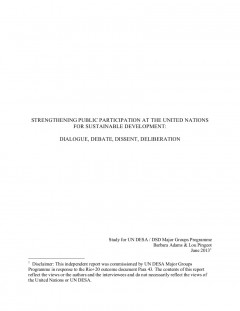
Cover
DIALOGUE, DEBATE, DISSENT, DELIBERATION
This study has identified many good practices in the sustainable development track and throughout the UN system that could be built on in the next iteration of the institutional framework for sustainable development. It has found the Major Group framework to be neither a panacea nor an impediment to participation in the future sustainable development architecture, and highlighted many options that could help make the Major Groups more inclusive and effective. These include structural, technical and financial improvements, in particular:
- More predictability, to respect and support the consultation process of organizations with decentralized constituencies and/or distant from UNHQ, in particular people’s’ and social movements. More predictability can be achieved through efforts by all parties, including through better internal Major Group governance as well as a commitment from the UN and Member States to provide adequate information to Major Groups and other stakeholders and to respect their consultation process by neither imposing impossible timelines nor pushing for false or forced consensus.
- Improved coherence between processes at the national, regional and global levels to enable full engagement of Major Groups and CSOs focused at the national and regional levels.
- Greater commitment on the part of the UN to seriously and meaningfully engage Major Groups and civil society, including through coherence and improved funding. This in turn requires regular and predictable financing and a clear mandate from Member States.
- These recommendations aim to improve both the quantity and quality of the inputs that Major Groups and other stakeholders can provide into the future hlpf policy process - and the official space to receive and debate these inputs. However, they are not sufficient to guarantee truly valuable engagement. Technical solutions must be accompanied by strong commitment from all parties, and at leadership levels, to engage in good faith. This responsibility rests with Major Groups, the UN system and Member States.
- Major Groups members who find the process valuable and helpful have a responsibility to reach out to people and organizations not involved in the framework, and to be more proactive in making space for other forms of organizing.
- UN DESA/DSD has a similar responsibility to reach out to other parts of the UN system. The UN as a whole, while remaining neutral, has a responsibility to implement its and Member State pronouncements to improve the quality of the engagement with non-state actors.
- Member States have the responsibility to engage meaningfully with Major Groups and other stakeholders, to listen to and debate with them, to engage them in deliberative and decision- making processes and to respect and support their organizing structures and activities.
- Ultimately, engagement by Major Groups and other stakeholders must go beyond formal consultation to active participation in the deliberative process. The opportunities to provide input have generally grown in recent years and constitute a valuable space that must be enhanced, certainly not reduced. However, this style of participation cannot be considered as the be-all and end-all for non-Member States. The full engagement of the diversity of civil society, including through Major Groups, is an essential ingredient for policy development and implementation and is a true test of effective multilateralism.
Link (extern)
